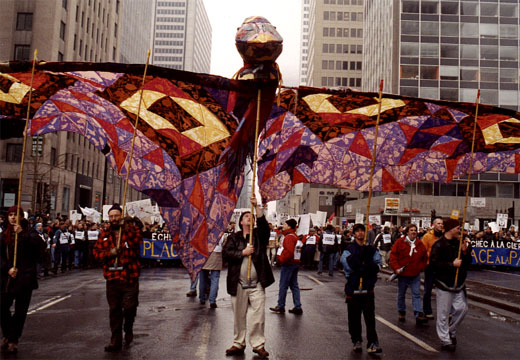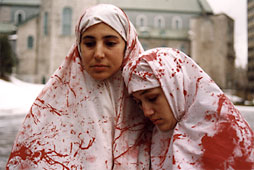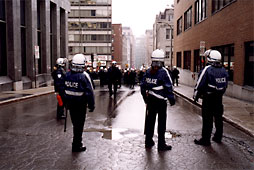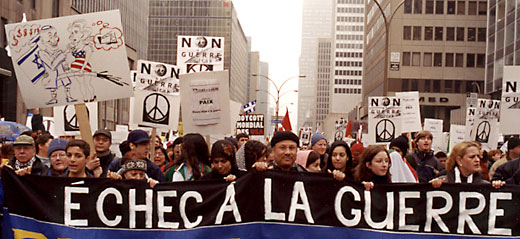
Darren Ell is a free-lance photographer from Montreal. His recent articles and photo essays from the Middle East can be viewed on Electronic Intifada, Electronic Iraq and ZNET.
[If you thought the war was over or your opposition to the war came to nothing, please remember these scenes and know that the mock airman with the well-rehearsed hollywood-engineered grin, is the one who is beginning to stumble all over the place. His fabrications are becoming apparent and he has fallen to scapegoating his advisors and the company men who surround him and clean up after him. The people of Iraq, on the other hand seem to be demonstrating extraordinary staying power and are beginning to strike back one day at a time. It also seems that the Blairs and the Howards and all their designated poodles are also all very much straying into every lawn they pass by and peeing without any definite action plans! They have become creatures of habit! – ED]
 |
|---|
| Symbols of peace and solidarity lead a march of 200,000 in Montreal. |
Despite the latest in a long list of violent horrors unleashed on the world by US power, despite the civilian body count, now more than double that of 9/11, despite the helplessness felt by millions worldwide, despite the cynicism underlying the reasons for the invasion, and despite the uncertain future awaiting the Iraqi people, there is hope in all of this. It could be found in the unprecedented scale of broad-based activism and organized opposition to the attack on Iraq. Signs of it were everywhere in countries around the world: massive record-breaking peace rallies, civil disobedience and innumerable vigils, cities like Rio de Janeiro declaring George Bush persona non grata and dozens of American city councils, including New York, L.A. and Chicago, adopting anti-war resolutions, or bridges in Rome draped in black and human chains in Germany. And behind the scenes there was the nuts and bolts work of lobbying, letter-writing and petition-signing and information-sharing carried out by individuals and organizations alike. This international resistance to foreign invasion was and continues to be the fruit of decades of progressive work by thousands of organizations and millions of people worldwide. An example of the strength of this movement could be seen in Montreal, Canada, where peace marches were per capita some of the largest in the world.
Opposition to this American war was high in Canada (70%) and public expressions of opposition were largest in Montreal where anti-war marches drew crowds of 200,000 people, remarkable for a city of 3.5 million. While violent foreign intervention has long been frowned on in French Canada, considerable credit for the scale of Montreal’s peace movement must go to the anti-war collective, Echec à la Guerre. The collective is broad-based, including more than 175 human rights groups, labour organizations, student associations, peace groups, community groups, cultural minority organizations, lay and religious organizations, women’s and artists’ groups. The collective circulated information to a wide audience regarding concrete actions like attending demonstrations or signing petitions, sending letters or phoning government officials, or attending educational events, and its website also connected citizens to the international anti-war movement. Aside from its overall objective of ending the US-led aggression, Echec à la Guerre pressured the Canadian government to pull its military personnel out of the Gulf and to publicly condemn the war. The collective also worked to build a boycott movement against Esso and MacDonald’s, part of a growing international movement to boycott America.
 |
 |
|---|---|
| Reminders of the reality of war. | Tensions rising at the U.S. Consulate |
The Montreal anti-war movement is typical of the development of resistance since the 1960’s and should be seen as a sign of hope for the future. Recall that it took nearly a decade and millions of deaths in Indochina before domestic and international grassroots opposition forced the US to leave the region. In the 1980’s, public outcry forced the Reagan Administration into relying on covert channels to fund its wars in Central America. The invasions of Panama and Iraq (1991) were over quickly due in part to a resistant and better-informed public. International public opinion is crucial in determining the actions of violent democratic regimes. An example is the Israeli government who has openly admitted that it cannot carry out all-out ethnic cleansing in the Occupied Territories because of its fear of international opinion. Unfortunately, it has adjusted its policy, carrying out a slow methodical destruction of Palestinian society – a murder here, a house demolition there – just enough to avoid the spectacle-seeking eyes of the international media.
While the efforts of the peace movement regarding Iraq could be seen as a failure – the invasion happened anyway – it could have been worse, and this must be seen as a victory for those interested in building a better world. This time around, protesters took to the streets before the hostilities began. As time moves on, public pressure is making it increasingly difficult for the US war machine to carry out protracted acts of aggression. While the machine is efficient and terribly devastating, and while it would be naive to think it will go away tomorrow, continued organizing and increased critical political awareness could one day relegate it to history’s closet of horrors, where it surely belongs.
 |
|---|
| Members of Montreal’s Echec à la guerre lead demonstrators through the streets of Montreal |
Photos © Darren Ell